Progressives lay out racial justice strategy to win over working-class whites
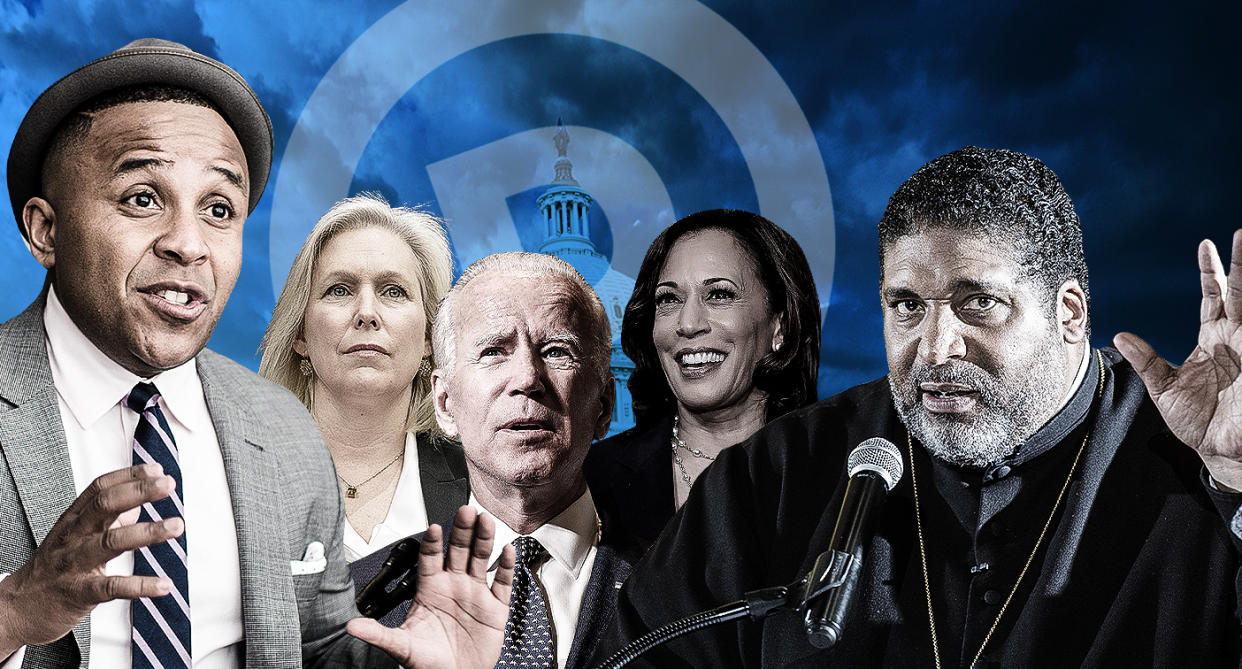
A few days before President Trump’s Twitter rant against four congresswomen of color, a few thousand progressives gathered in Philadelphia to hear speakers exhort them to make race a central issue in the 2020 election.
“We’ve got to center racial justice,” Rashad Robinson, the executive director of Color of Change, told the Netroots Nation conference. Robinson told the audience that “racial justice is a strategy for gaining power and winning power.”
Robinson represents a left wing of the party that wants to confront Trump’s demagoguery on race and identity head on, not shying away from the topic.
“Democrats for years tried to both mobilize and engage black voters and voters of color and tried to avoid conversations around race with white folks, and it just didn’t work,” he told Yahoo News in an interview a few days after his Netroots speech.
“Democrats not talking about race doesn’t mean race is not going to be talked about,” Robinson said.
But can Democratic politicians do that in a way that wins new converts, particularly among the white working class whose votes might decide the 2020 election in the key battleground states of Wisconsin, Michigan and Pennsylvania? Is there a way for Democrats to talk about systemic racism in a way that actually wins over white voters rather than alienating them? Robinson was clear-eyed about the challenge. “People could come to hate Trump and not love our side in return,” he said.
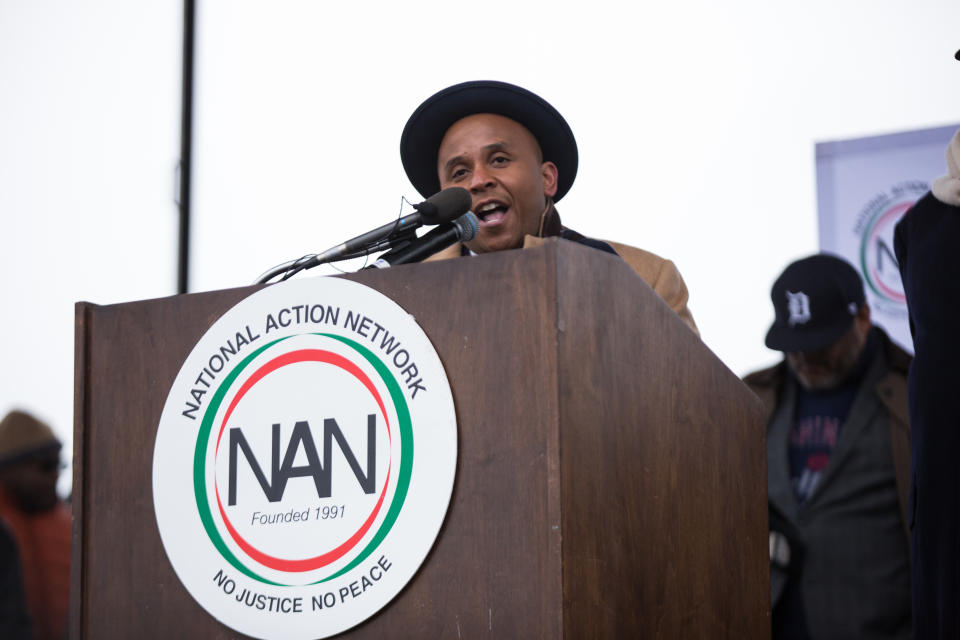
Robinson and other progressive leaders who spoke to Yahoo News echoed a consistent message. The way to make racial justice a political winner, they said, is to combine it with a populist message aimed at convincing working-class whites that they’ve been distracted by the politics of race while wealthy elites take advantage of middle class and poor people of all races and ethnicities.
The Rev. Greg Holston, the leader of the Philadelphia interfaith group Power, spoke at Netroots after Robinson and denounced what he called an “unholy alliance between the white elite and the white working class.”
“We cannot win … unless we build a real black and Latino and working-class white-folk coalition that can stand together,” he said.
The Rev. William Barber, a North Carolina minister who was central to a series of protests against the Republican state legislature in 2013, has said much the same thing. “The persons who get elected by what some courts have now called surgical racism, once in office they vote to deny health care, living wages, cut public education, deny women’s rights, consumer rights, LGBTQ rights in ways that hurt — in raw numbers — more rural white people,” he told former Vice President Joe Biden at the event.
Barber’s Poor People’s Campaign hosted nine Democratic presidential candidates in Washington, D.C., in mid-June. And during that daylong event, he repeatedly came back to the same theme, that issues like voter suppression and gerrymandering — often interpreted solely as something done by white politicians to hurt black communities — does just as much to hurt poor whites.
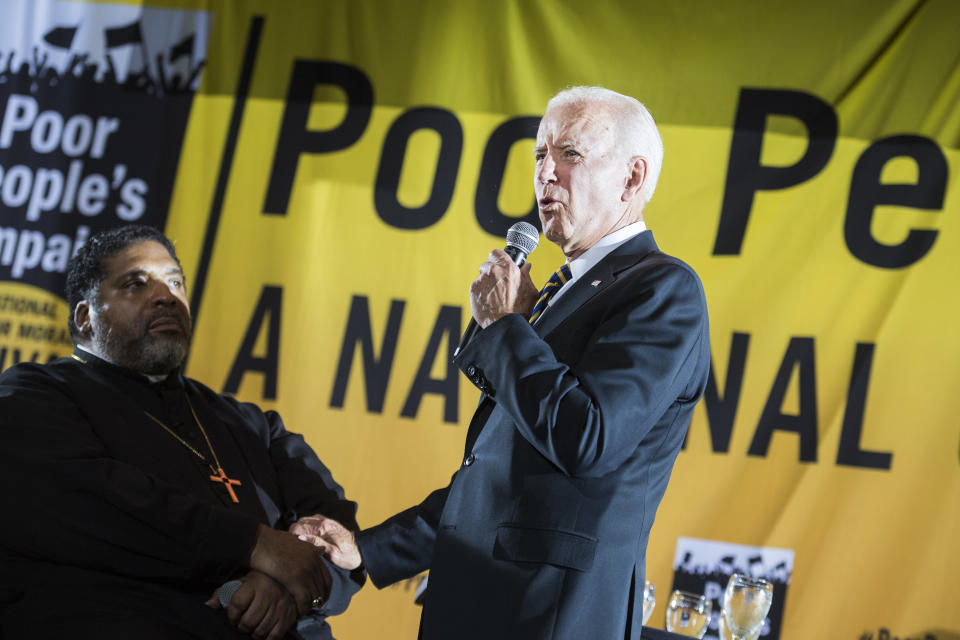
Biden appeared to be in agreement to a certain degree. “The charlatans have been able to pit black folks against white folks against Latino” by telling “poor folks” that they are poor “because of all those immigrants, all those Muslims, all those African-Americans,” Biden said.
Sen. Bernie Sanders, I-Vt., was even more pointed in his remarks at the Poor People’s Campaign event. “We say to those white workers, ‘You think African-Americans and immigrants are your enemies? Why don’t you take a look at Wall Street?’” Sanders said.
Robinson said calling out specific “villains” like Sanders did — and Biden didn’t — is crucial because it’s the “full story.”
“If we are not willing to name the villains and the profiteers, the corporations and other businesses and the way the rules have been set up, if we’re not able to explain that and walk people through that because we are too afraid of losing corporate support or corporate dollars, then we don’t have a compelling story for people about exactly why it’s happening, and Donald Trump’s story will be compelling for people.”
Immigration offers one example. The progressive message is that the business community pushed the U.S. government to take a lax enforcement approach to border security for decades because it provided them with cheap labor from South and Central America. Immigrants had no leverage to organize themselves to demand higher wages or better working conditions.
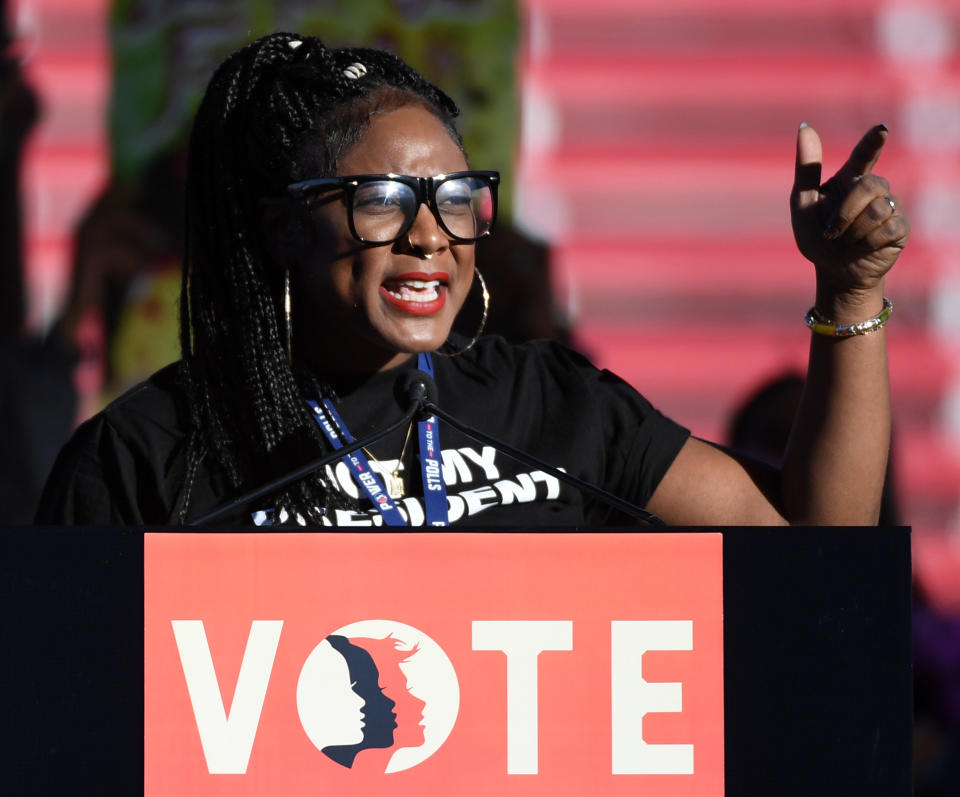
And now those same business leaders are backing Republican candidates like Trump, who pass huge tax cuts for corporations while demonizing immigrants. Meanwhile, working-class whites were also victimized by globalization and outsourcing. “The injustice of companies moving their businesses overseas, not paying taxes, and depriving the white working class of benefits and income is also an unrighteous and unjust act,” Holston, the Philadelphia preacher, told Yahoo News.
“We should be lifting up justice for everyone,” he said.
At the Netroots conference, Alicia Garza, one of three women credited with starting the Black Lives Matter conference, was asked what her message would be to people who aren’t black.
“Black people’s issues are your issues too,” she said.
*****
One potential obstacle to a populist approach to race is language. A voter recently questioned presidential candidate Kirsten Gillibrand in Youngstown, Ohio, about how she and other Democrats can speak of “white privilege” to whites in the Rust Belt, where an entire way of life has been uprooted by globalization and outsourcing, creating desolate wastelands where joblessness and a loss of hope have led to epidemics of drug addiction and suicide.
“I hear you saying there is a lot of divisive language coming from Republicans, coming from Trump and that we are looking for ways to blame each other. But the Democratic Party loves to throw around terms like ‘white privilege,’” the woman, who was unidentified in news reports, asked Gillibrand, a Democratic senator from New York. “Now this is an area that across all demographics has been depressed because of the loss of its industry and the opioids crisis. So what do you have to say to people in this area about so-called white privilege?”
Gillibrand talked at length about her recognition “that families in this community are suffering deeply.”
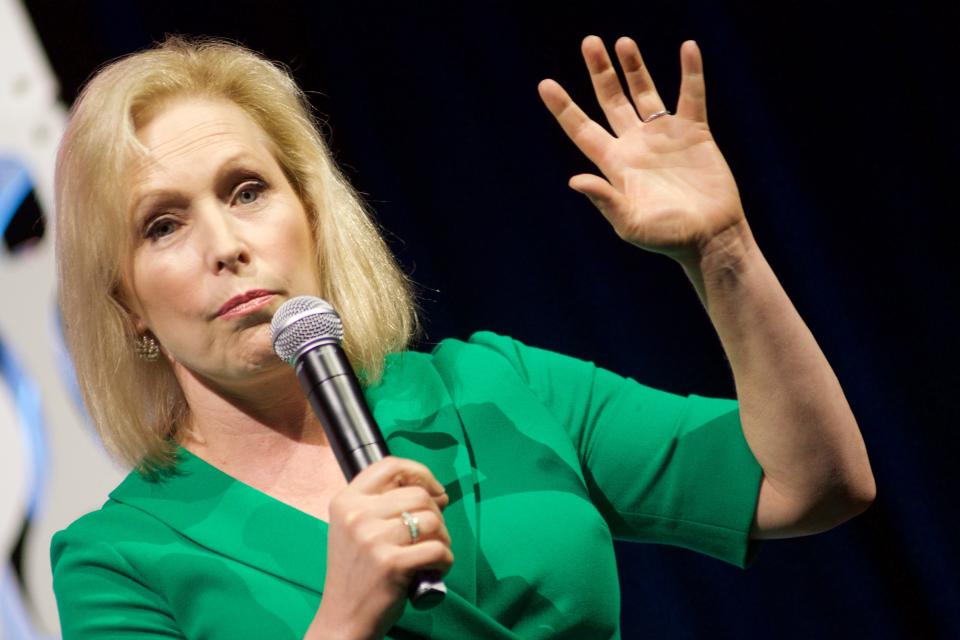
“That is devastating when you’ve lost your job, you’ve lost your ability to provide for your kids, that when you put 20, 30 years into a company that all of a sudden doesn’t care about you or won’t call you back and gives you a day to move. That is not acceptable and not OK. So no one in that circumstance is privileged on any level, but that’s not what that conversation is about,” Gillibrand said.
Yet, she continued, “institutional racism is real. It doesn’t take away your pain or suffering. It’s just a different issue. Your suffering is just as important as a black or brown person’s suffering, but to fix the problems that are happening in a black community you need far more transformational efforts that are targeted for real racism that exists every day.”
Gillibrand did not make the explicit linkage that leaders like Barber, Robinson and Holston have called for — between racial justice and an economic populism that extends a hand to white working-class workers.
That, however, is exactly the message that Sanders and Sen. Elizabeth Warren, D-Mass., are taking on the campaign trail.
“The rules are rigged because the rich and powerful have bought and paid for too many politicians. And if we dare to ask questions, they will try to divide us: pit white working people against black and brown working people so they won’t band together and demand real change,” Warren said in a commencement speech last December at Morgan State, a historically black university.
Sen. Kamala Harris, D-Calif., meanwhile, is taking more of a generalist approach, with some elements of the Warren and Sanders populism on big issues like health care combined with a self-proclaimed “joyful warrior” image, as she is often introduced at her campaign events. She wants to be known as a politician who speaks tough truths about racism, but who ultimately seeks to unite the country rather than divide it.
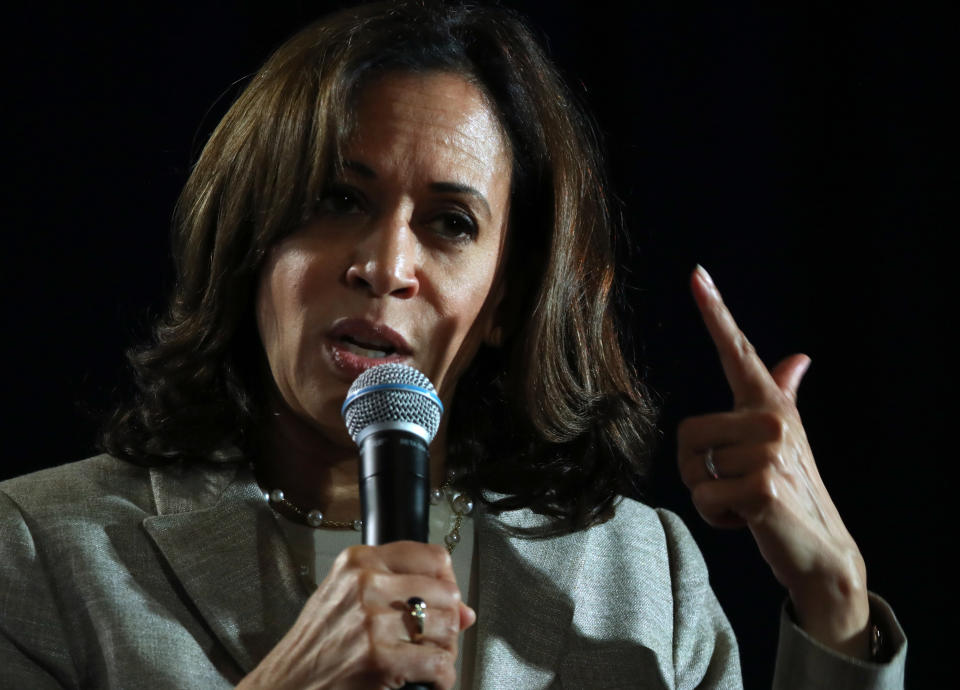
“I think that the American people want a leader who speaks truth, even when sometimes it might make people uncomfortable,” Harris said Sunday while campaigning in New Hampshire.
She said racial justice wasn’t the only hard truth that needed attention, mentioning economic inequality and climate change as other examples. But, she said, “we need to speak the truth that we have had racism and racist policies in our country, and we need to address those.”
“Sometimes it might make us uncomfortable to deal with America's history on race, but these are truths that must be spoken so we can deal with them,” she said. “And I do believe the vast majority of Americans want … a system in our country that treats people equally and gives people equal dignity and respect.”
Robinson, the leader of Color of Change, spoke to Yahoo News the day after Trump’s Twitter assault on four black and brown women in Congress. He said he was “less interested in politicians calling Trump a racist.”
“The path forward is not about whether or not Trump is a racist. He got elected, and we already knew all that,” Robinson said. “The question for Democrats is what is the path forward and how is the story different and is it plausible?”
_____
Download the Yahoo News app to customize your experience.
Read more from Yahoo News:



